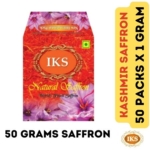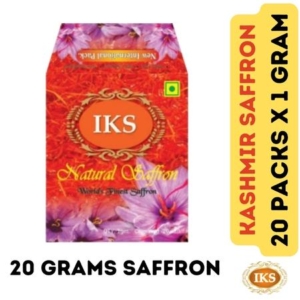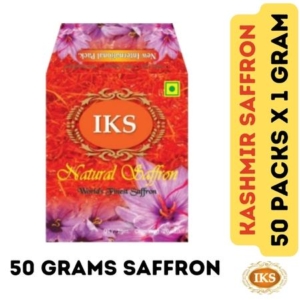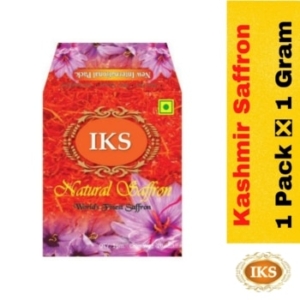
Let customers speak for us
from 99 reviewsIt's been 3 days since my first use of IKS Saffron. I have used it in warm water and honey and other times I would just pinch a bit and chew it up. Either way tastes very good.
It is amazing to watch the brilliant ruby red Saffron turn the cup of water into an almost bright gold color.
About 20 minutes after drinking my first cup of Saffron with honey, I started to notice that I wasn't having the horrible intestinal discomfort and the bad mood that went along with the abdominal pain. Wow !!! I have been using the Saffron everyday since it came in the mail.
I am very grateful and thankful to you all for the best, the purest and the most carefully handled Saffron.
Thank you again IKS, and I will be ordering more very soon for my mother.
Charles Van Buren

very happy with the product.
tested it and it made me happy. Thanks IKS

This is the 2nd buy of this product and we will buy it again. Great quality! Fast delivery!

I was searching for a good quality saffron and my search ended here. The quality is very good. I wanted to gift this to someone whom I like and they liked it very much. I recommend this product. For people who haven't ordered before, you can blindly order one without any problem. The only problem I faced was that IKS team couldn't trace delivery address quite easily as it was a remote location. IKS team was very cooperative and was just a msg away through WhatsApp, much appreciated.

Authentic Kumkuma Puvvu Online – Indiakashmirsaffron.com: Your One-Stop Shop for Buying Kesar
Kumkuma Puvvu, also known as Saffron, is a popular spice that has been used for centuries in various cuisines, religious rituals, and medicinal purposes. Its rich flavor, aroma, and color have made it a staple ingredient in many Indian dishes, particularly in the North Indian cuisine. Today, you can easily buy Kumkuma Puvvu online from various websites, and one of the best places to do so is www.indiakashmirsaffron.com.
High-Quality and Authentic Kumkuma Puvvu Online
Indiakashmirsaffron.com is a website that specializes in selling authentic and high-quality Kumkuma Puvvu online. The website sources its Saffron directly from the fields of Kashmir, which is known for producing the world’s finest Saffron. The website also offers a wide range of Kumkuma Puvvu products, including pure Kumkuma Puvvu, Kumkuma Puvvu powder, and Kumkuma Puvvu oil.
Convenient Online Shopping – Authentic Kumkuma Puvvu Online
One of the advantages of buying Kumkuma Puvvu online from indiakashmirsaffron.com is the convenience it offers. You can browse the website and make your purchase from the comfort of your home, and the product will be delivered to your doorstep. The website also offers free shipping for orders above a certain amount, making it even more affordable.
Quality and Freshness Guaranteed – Authentic Kumkuma Puvvu Online
Another advantage of buying Kumkuma Puvvu from indiakashmirsaffron.com is the quality of the product. The website guarantees that its Kumkuma Puvvu is 100% pure and natural, with no additives or preservatives. The Saffron is also carefully handpicked and packed to ensure that its quality and freshness are preserved.
Sustainable and Ethical Business Practices
When you buy Authentic Kumkuma Puvvu Online from indiakashmirsaffron.com, you can also be sure that you are supporting a sustainable and ethical business. The website works directly with farmers in Kashmir, ensuring that they receive fair prices for their products and that their livelihoods are supported.
Experience the Richness and Flavor of Authentic Kumkuma Puvvu Online Today!
In conclusion, if you are looking to buy Kumkuma Puvvu online, indiakashmirsaffron.com is an excellent choice. The website offers high-quality and authentic Kumkuma Puvvu products at affordable prices, with the convenience of online shopping and the assurance of supporting a sustainable and ethical business. So why wait? Head over to indiakashmirsaffron.com and experience the richness and flavor of authentic Kumkuma Puvvu today!
Kesar for Pregnancy: Safety, Benefits, and More
/0 Comments/by iksKesar for Pregnancy: Safety, Benefits, and More
Kesar for Pregnancy – Are you looking for a natural way to support the health of pregnant people during vaginal delivery and abortion? Consider the benefits of cervical ripening. Look no further than saffron, also known as kesar. This ancient spice has numerous benefits and has been used for centuries to soothe various ailments. It is renowned for its medicinal properties, which have been supported by clinical trials conducted in hospitals. But did you know that saffron can provide various benefits specifically for pregnant people and the fetus during pregnancy?
Packed with essential nutrients, saffron can aid in cervical ripening, making it beneficial for pregnant women preparing for labor and delivery. Saffron can help in the dilation of the cervix, promoting uterine contractions and facilitating the safe delivery of the fetus. In some cases, saffron consumption may even reduce the need for a cesarean section. Saffron can help in the dilation of the cervix, promoting uterine contractions and facilitating the safe delivery of the fetus. In some cases, saffron consumption may even reduce the need for a cesarean section. Its antioxidant and anti-inflammatory properties may help reduce the risk of complications during cervical ripening, promote a smoother pregnancy journey, and support labor induction for a healthy fetus while avoiding abortion. Clinical trials and studies have shown promising results, indicating that saffron consumption may contribute to easier vaginal deliveries by promoting cervical ripening and uterine contractions. Additionally, saffron consumption can also help in the induction of labor when necessary, potentially reducing the need for cesarean sections.
So, if you’re curious about the potential advantages of incorporating saffron into your pregnancy diet for fetal development, cervical ripening, and cesarean section, join us as we delve into the research and explore the fascinating world of kesar’s impact on the cervix, labor induction, and more.
Safety of Saffron: Is it Safe to Consume during Pregnancy?
Consuming saffron in moderate amounts is generally considered safe during pregnancy.
Saffron, also known as kesar, is a popular spice that is derived from the flower of Crocus sativus. It has no connection to the cervix, pills, or terms like bishop. It has no connection to the cervix, pills, or terms like bishop. Saffron has been studied for centuries in terms of its potential health benefits. It has been used in cooking and traditional medicine, leading many women to wonder if saffron pills are safe to consume. The good news is that consuming saffron pills in moderate amounts is generally considered safe during pregnancy. A study has shown that saffron can aid in cervical ripening, potentially reducing the need for a cesarean section.
During pregnancy, it’s important to maintain a balanced diet that provides all the necessary nutrients for both the mother and the developing baby. Additionally, monitoring uterine contractions is crucial for pregnant participants as it helps in understanding the progress of labor. It’s essential to familiarize oneself with the terms related to pregnancy and childbirth to better communicate with healthcare professionals. Additionally, monitoring uterine contractions is crucial for pregnant participants as it helps in understanding the progress of labor. It’s essential to familiarize oneself with the terms related to pregnancy and childbirth to better communicate with healthcare professionals. Saffron pills contain several vitamins and minerals such as vitamin C, iron, and potassium, which can be beneficial for pregnant women undergoing labor induction. In the study, participants were given saffron pills to assess their effects. Saffron may help improve digestion and reduce nausea during pregnancy, as well as potentially aid in uterine contractions and labor induction. This could potentially reduce the need for a cesarean section or the use of a placebo.
However, before adding saffron to your diet, it’s important to consult with your healthcare provider for a placebo test intervention study.
Some studies suggest that excessive consumption of saffron may have adverse effects on pregnancy.
While moderate consumption of saffron is generally safe during pregnancy, it is important to avoid excessive intake. This recommendation is supported by a study that tested the effects of saffron on labor and found that it may act as a placebo. Some studies suggest that high doses of saffron may have adverse effects on pregnancy outcomes. A placebo study was conducted with labor participants to investigate this. A placebo study was conducted with labor participants to investigate this. These studies emphasize the significance of a saffron study, where participants were given a placebo. It is crucial for participants to consume saffron in moderation, following the recommended amount set by Bishop.
One concern regarding excessive consumption of saffron during pregnancy is its potential to stimulate labor. This is supported by a study which found that participants who consumed saffron experienced increased uterine contractions. However, it’s important to note that this study also included a placebo group, suggesting that the effects of saffron on labor may not be solely due to the herb itself. In some cultures, saffron has traditionally been used to stimulate contractions and induce labor. A tabriz intervention study was conducted to examine the effects of saffron on labor induction in participants. Therefore, a study on saffron consumption suggests that consuming large amounts of saffron could potentially lead to premature labor contractions or even miscarriage. It’s important to exercise caution when using any herbal remedy or spice during pregnancy, as a study has shown that certain interventions can affect labor.
Furthermore, a study on saffron conducted by Bishop et al. in Tabriz found that high doses of saffron may increase body temperature and blood pressure levels, leading to a higher score on health risk assessments. Elevated body temperature during labor can be harmful to the developing fetus, according to a study. This is especially true during the first trimester when organ formation occurs. It is important to monitor and maintain a safe body temperature to ensure a healthy score for the fetus. Similarly, a recent study found that individuals with high blood pressure are more likely to score higher on tests measuring the risk of developing preeclampsia compared to those without high blood pressure in the control group. Therefore, it’s important to study and monitor saffron consumption within a group and ensure it remains within safe limits in order to score a good outcome.
Potential Benefits of Saffron for Pregnant Women
During pregnancy, a group of women often experience digestive issues such as nausea, bloating, and constipation. These symptoms can significantly impact the overall score of their pregnancy experience. However, saffron may offer some relief by improving digestion. This vibrant spice has been used for centuries in traditional medicine to alleviate gastrointestinal discomfort in a group of people. It has been found to have a high score for its effectiveness. Its anti-inflammatory properties can help soothe the stomach and reduce inflammation in the digestive tract, making it beneficial for individuals in a group with digestive issues. Additionally, it may also contribute to improving their overall score of digestive health.
Gestational diabetes is a common concern during pregnancy, characterized by high blood sugar levels. The score for diagnosing gestational diabetes is based on a group of criteria. The score for diagnosing gestational diabetes is based on a group of criteria. Saffron may potentially play a role in regulating blood sugar levels and reducing the risk of gestational diabetes. This could help individuals maintain a healthy score and decrease their chances of developing this condition during pregnancy. Additionally, incorporating saffron into one’s diet may be beneficial for those who are part of the group at higher risk for gestational diabetes. This could help individuals maintain a healthy score and decrease their chances of developing this condition during pregnancy. Additionally, incorporating saffron into one’s diet may be beneficial for those who are part of the group at higher risk for gestational diabetes. Studies have shown that saffron extracts can improve insulin sensitivity and enhance glucose metabolism, leading to a better score on glucose tolerance tests. This effect was observed in both the control group and the experimental group. By promoting better blood sugar control, saffron could contribute to a healthier pregnancy for a group of women.
Antioxidants are essential for overall well-being, especially during pregnancy when oxidative stress levels tend to increase. These antioxidants are crucial for the health of both the mother and the growing group inside her. These antioxidants are crucial for the health of both the mother and the growing group inside her. Saffron, a powerful antioxidant group, can combat oxidative stress and protect against cell damage caused by free radicals. These antioxidants promote a healthy immune system and support the development of the fetus in a group.
One notable benefit of saffron for pregnant women is its potential to regulate uterine contractions in a group. While more research is needed in this area, some studies suggest that saffron might help prevent preterm labor or delay labor when it occurs too early in a group of pregnant individuals. However, it’s important to note that using saffron for this purpose should only be done under medical supervision.
In a study involving pregnant participants, outcomes showed positive effects of saffron consumption during pregnancy on both primary and secondary outcomes. The primary outcome focused on maternal health indicators such as gestational age at delivery and birth weight, while secondary outcomes included parameters like neonatal morbidity and mortality rates.
It’s worth mentioning that although saffron offers potential benefits for pregnant individuals, it should be consumed in moderation as part of a balanced diet. Excessive intake may lead to adverse effects due to its potency. It’s always advisable to consult with a healthcare professional before incorporating saffron into your pregnancy diet.
Managing Mood Swings and Morning Sickness with Saffron
Saffron, known as “kesar,” has long been used as a natural remedy for various health issues.Saffron has gained attention for its potential benefits in managing mood swings and morning sickness symptoms.
Natural Remedy for Mood Swings and Depression Symptoms
Pregnancy brings about hormonal fluctuations that can often lead to mood swings and feelings of depression. Traditionally, saffron has been used as an antidepressant to help alleviate these symptoms. While scientific research on saffron’s effects during pregnancy is limited, some studies suggest that it may have positive impacts on mood regulation.
Reducing Morning Sickness Symptoms
Morning sickness is a common ailment experienced by many pregnant women, causing nausea and vomiting during the early stages of pregnancy. Fortunately, saffron may offer some relief from these unpleasant symptoms. Although further research is needed to establish definitive conclusions, preliminary studies indicate that saffron may help reduce the severity of morning sickness.
The Calming Effect of Saffron Aroma
In addition to its potential benefits for mood swings and morning sickness, the aroma of saffron itself can have a calming effect on pregnant women. The soothing scent promotes relaxation and can provide a sense of comfort during times of stress or anxiety.
While incorporating saffron into your pregnancy routine may seem appealing, it’s crucial to consult with your gynecologist or healthcare provider before doing so. They will be able to provide personalized advice based on your specific circumstances.
It’s important to note that not all remedies work the same way for everyone. Some individuals may experience allergies or adverse reactions when consuming saffron or using products containing this spice. Always prioritize your safety by discussing any concerns with your healthcare professional before trying new supplements or remedies.
To conclude, while saffron shows promise in managing mood swings and reducing morning sickness symptoms during pregnancy, more research is needed to fully understand its effects. It’s always best to consult with your healthcare provider before incorporating any new supplements into your routine. Remember, each pregnancy is unique, and what works for one person may not work for another.
Relieving Muscular Cramps and Promoting Better Sleep with Saffron
Saffron, the exotic spice known for its vibrant color and unique flavor, may offer more than just culinary delights.Saffron has been touted for its potential benefits in relieving muscular cramps and promoting better sleep. While individual results may vary, incorporating saffron into your routine might help alleviate some of the discomforts associated with pregnancy.
Anti-Inflammatory Properties Soothe Muscular Cramps
One common complaint during pregnancy is muscular cramps, which can be quite uncomfortable. The good news is that saffron possesses anti-inflammatory properties that may help soothe these cramps. By reducing inflammation in the muscles, saffron could potentially provide relief from the pain and discomfort caused by cramping.
Better Sleep Quality with Saffron Milk
Sleep problems are not uncommon during pregnancy. Many expectant mothers struggle to find a comfortable position and experience restlessness throughout the night. This is where saffron milk comes into play. Consuming a warm glass of saffron-infused milk before bedtime might aid in achieving better sleep quality.
Saffron has soothing effects on the body, which can promote relaxation and calmness. It acts as a natural sedative, helping to induce sleep and improve overall sleep duration. So if you’re tossing and turning at night due to pregnancy-related discomforts or insomnia, a cup of saffron milk might just do the trick.
Individual Results May Vary
While there are anecdotal reports of saffron’s benefits for relieving muscular cramps and improving sleep quality during pregnancy, it’s important to note that individual results may vary. What works for one person may not have the same effect on another.
As with any supplement or alternative remedy, it’s always best to consult with a healthcare professional before incorporating saffron into your pregnancy routine. They can provide personalized advice based on your specific needs and medical history, ensuring that saffron is safe for you and your baby.
Can Saffron Change Baby’s Skin Tone? Understanding the Effects on Skin Color
There is a common belief that consuming saffron during pregnancy can alter the skin tone of the baby. However, there is no scientific evidence to support this claim. The color of a baby’s skin is determined by genetics and other factors, not by saffron consumption.
No Scientific Evidence for Skin Tone Change
Contrary to popular belief, there is no research or scientific studies indicating that consuming saffron during pregnancy can change the baby’s skin tone. The pigmentation of an unborn child’s skin is primarily determined by genetic factors inherited from their parents. While saffron may have certain benefits for the skin, such as improving complexion or reducing blemishes, it does not have the power to alter natural pigmentation.
Genetic Factors and Other Influences
The color of a person’s skin is primarily influenced by their genes. Different combinations of genes inherited from both parents determine the melanin production in an individual’s body, which ultimately affects their skin color. Saffron consumption cannot override these genetic factors and change the inherent pigmentation.
Other external influences such as exposure to sunlight and environmental factors can also play a role in determining a person’s skin tone. For example, individuals living in regions with ample sunlight tend to have darker skin tones due to increased melanin production as a protective mechanism against harmful UV rays.
Benefits of Saffron for Skin Health
While saffron may not change the baby’s skin tone, it does offer potential benefits for overall skin health. Saffron contains antioxidants that help protect the skin from damage caused by free radicals and oxidative stress. These antioxidants can contribute to maintaining healthy-looking skin and reducing signs of aging.
Saffron has been used traditionally in skincare remedies for its potential anti-inflammatory properties. It may help soothe irritated or inflamed skin conditions like acne, eczema, or psoriasis. However, it is important to note that individual results may vary, and it is always best to consult with a healthcare professional before using saffron for any specific skin concerns during pregnancy.
The Importance of a Healthy Lifestyle
While saffron may not change the baby’s skin tone directly, maintaining a healthy lifestyle during pregnancy can have positive effects on neonatal outcomes, including the baby’s overall health and well-being. Eating a balanced diet rich in essential nutrients, staying hydrated, getting regular exercise (as recommended by a healthcare professional), and managing stress levels are all crucial factors that contribute to a healthy pregnancy.
Risks and Side Effects of Consuming Saffron during Pregnancy
During pregnancy, it’s important to be mindful of what you consume, as certain foods and substances can have an impact on both the mother and the developing baby. Saffron, a popular spice known for its vibrant color and distinct flavor, is often used in cooking and traditional remedies. However,There are some risks and side effects that need to be considered.
Uterine Contractions and Miscarriage Risk
One of the primary concerns associated with excessive consumption of saffron during pregnancy is the potential risk of uterine contractions. Saffron contains compounds that may stimulate the uterus, leading to contractions. While this effect might not pose a problem in normal circumstances, it could potentially result in miscarriage or premature labor if consumed in large doses.
Allergic Reactions
Just like any other food or spice, some individuals may be allergic to saffron. If you have known allergies or have experienced adverse reactions after consuming saffron in the past, it’s crucial to exercise caution during pregnancy. Allergic reactions can range from mild symptoms such as itching or hives to more severe manifestations like difficulty breathing or swelling of the face and throat. If you suspect an allergy to saffron or any other ingredient, it’s best to consult with your healthcare professional before consuming it.
Moderation is Key
While saffron has been used traditionally for various purposes during pregnancy, including promoting digestion and reducing morning sickness, it’s essential to consume it in moderation. Consulting with a healthcare professional who specializes in prenatal care can provide personalized advice based on your specific situation.
Here are some key points to consider:
-
Limit your intake: It’s advisable not to exceed the recommended dosage of saffron during pregnancy.
-
Discuss with your doctor: Talk openly with your healthcare provider about your desire to consume saffron and any concerns you may have. They can provide guidance based on your medical history and current condition.
-
Look for alternatives: If you’re unsure about the safety of consuming saffron during pregnancy, consider exploring other natural remedies or consulting with an herbalist who specializes in prenatal care.
Remember, every pregnancy is unique, and what works for one person may not work for another. It’s important to prioritize the health and well-being of both the mother and the baby by making informed decisions regarding food consumption during pregnancy.
Benefits of Kesar/Saffron for Digestion and Sleep
Saffron, also known as kesar, has been used for centuries to enhance various aspects of health. Apart from its culinary uses, saffron is believed to offer benefits for digestion and sleep. Let’s explore how this vibrant spice can potentially improve these areas.
Improved Digestion
Saffron has long been valued for its ability to promote healthy digestion. It stimulates the production of digestive enzymes, which play a crucial role in breaking down food and facilitating nutrient absorption. By enhancing enzyme activity, saffron aids in the smooth functioning of the digestive system.
Incorporating saffron into your diet can be as simple as adding a pinch to your favorite dishes or beverages. Saffron-infused water or tea can provide a gentle boost to your digestive processes. Its natural properties may help alleviate common issues such as bloating, indigestion, and constipation.
Better Sleep Quality
If you struggle with sleep-related issues like insomnia or restless nights, saffron might offer some relief. This precious spice possesses calming properties that can help reduce anxiety and induce relaxation. By promoting a sense of tranquility, saffron may contribute to better sleep quality.
One popular way to harness the sleep-enhancing benefits of saffron is by preparing saffron-infused milk before bedtime. Warm milk itself is known for its soothing effects on the body and mind. Adding a few strands of saffron to it can further enhance its sedative properties.
How to Incorporate Saffron into Your Routine
There are several ways you can incorporate saffron into your daily routine:
-
Saffron-Infused Milk: Heat a cup of milk with a few strands of saffron until it reaches a gentle boil. Allow it to cool slightly before drinking it before bedtime.
-
Culinary Delights: Add a pinch of saffron to your rice dishes, soups, stews, or desserts for both flavor and potential health benefits.
-
Herbal Tea: Steep a few strands of saffron in hot water to create a fragrant and calming tea.
Remember that saffron is potent, so a little goes a long way. Start with small amounts and gradually increase as per your preference.
Frequently Asked Questions about Kesar for Pregnancy
Is it safe to consume saffron throughout the entire duration of pregnancy?
Also known as kesar, during pregnancy, it is generally considered safe in moderate amounts. Saffron has been used for centuries in traditional medicine and culinary practices. It is believed to have various health benefits, including its potential to aid digestion, improve sleep quality, and boost mood.
However, it’s important to note that there isn’t enough scientific evidence available to fully support these claims. While saffron is generally safe for consumption during pregnancy, it’s always a good idea to consult with your healthcare provider before adding any new supplements or ingredients to your diet.
Can I use saffron as a spice in my meals while pregnant?
Yes, you can definitely use saffron as a spice in your meals during pregnancy. Saffron adds a unique flavor and vibrant color to dishes and is commonly used in cuisines around the world. However, moderation is key when using saffron or any other ingredient during pregnancy.
Adding a pinch of saffron to your dishes can enhance the taste and aroma without causing any harm. Remember that excessive consumption of anything may not be beneficial for you or your baby’s health. It’s always best to follow a balanced diet that includes a variety of nutritious foods.
Are there any specific precautions I should take when using saffron during pregnancy?
While saffron is generally safe for consumption during pregnancy, it’s essential to exercise caution and take certain precautions:
-
Quality: Ensure that you are purchasing high-quality saffron from reputable sources. Look for pure strands without any added ingredients or adulterants.
-
Quantity: Limit your intake of saffron to small amounts. A few strands (around 5-6) dissolved in warm milk or water are sufficient.
-
Allergies: If you have any known allergies or sensitivities to saffron, it’s best to avoid its consumption during pregnancy.
-
Medical Conditions: If you have any underlying medical conditions or complications, such as gestational diabetes or high blood pressure, consult your healthcare provider before consuming saffron.
Remember that every pregnancy is unique, and what works for one person may not work for another. It’s always a good idea to seek guidance from your healthcare provider regarding the use of saffron during pregnancy.
Is it Safe to Drink Saffron Milk during Pregnancy?
Drinking saffron milk in moderation is generally considered safe during pregnancy.
During pregnancy, many women seek natural remedies and dietary changes to support their health and the development of their baby. One such remedy that has gained popularity is saffron milk. Saffron, also known as kesar, is a spice derived from the flower of Crocus sativus. It is known for its vibrant color and distinct flavor. But is it safe to consume saffron milk during pregnancy? Let’s find out.
However, it’s essential to ensure that the milk is pasteurized and free from any contaminants.
When considering saffron milk during pregnancy, it’s crucial to prioritize safety. Opting for pasteurized milk reduces the risk of harmful bacteria and ensures that any potential contaminants are eliminated. Pasteurization involves heating the milk to kill bacteria without compromising its nutritional value. Make sure the saffron used in the milk is of high quality and free from any adulterants or impurities.
Consulting with your healthcare provider before incorporating saffron milk into your diet is recommended.
As with any dietary change during pregnancy, it’s always wise to consult with your healthcare provider before adding saffron milk to your routine. Your doctor can provide personalized guidance based on your specific health needs and medical history. They can also address any concerns or potential risks associated with consuming saffron milk during pregnancy.
Saffron contains several beneficial compounds that may offer certain advantages during pregnancy:
-
Antioxidant properties: Saffron contains antioxidants that help protect cells from oxidative stress and damage caused by free radicals.
-
Mood enhancement: Some studies suggest that saffron may have mood-enhancing effects due to its ability to increase serotonin levels in the brain.
-
Digestive benefits: Saffron has been traditionally used to aid digestion and alleviate gastrointestinal discomfort.
-
Iron content: Saffron is a natural source of iron, which is essential for the production of red blood cells and preventing iron deficiency anemia.
However, it’s important to note that scientific research on the specific effects of saffron during pregnancy is limited. While saffron milk in moderation is generally considered safe, excessive consumption should be avoided as it may have adverse effects.
When Can Saffron be Taken during Pregnancy?
It is generally safe to start consuming small amounts of saffron after the first trimester of pregnancy.
During pregnancy, it’s natural for mothers-to-be to have questions about what they can and cannot consume. One such question often arises regarding the consumption of saffron, a popular spice known for its unique flavor and potential health benefits. While saffron can add a delightful touch to various dishes, it’s important to consider whether it is safe to consume during pregnancy. The good news is that, in most cases, it is generally safe to start incorporating small amounts of saffron into your diet after the first trimester.
However, it’s crucial to consult with your healthcare provider for personalized advice based on your specific pregnancy.
Every pregnancy is unique, and what may work for one woman may not necessarily work for another. Therefore, before introducing saffron into your diet or taking any supplements, it’s essential to consult with your healthcare provider. They will be able to provide personalized advice based on factors such as your gestational age and any underlying health conditions you may have. Your healthcare provider will take into account these factors and guide you on whether consuming saffron is appropriate for you.
When discussing the timing of when saffron can be taken during pregnancy, gestational age plays a significant role. The first trimester is considered a critical period in fetal development where major organs are forming. During this time, it’s best to err on the side of caution and avoid introducing new substances into your body without medical guidance.
Once you enter the second trimester (around 13 weeks), the risk of complications decreases significantly. This is when many healthcare providers give their approval for incorporating small amounts of saffron into your diet if desired. However, keep in mind that moderation is key – excessive consumption should still be avoided.
Saffron has been traditionally used in various cultures for its potential benefits during pregnancy. It is believed to aid digestion, improve mood, and even have antioxidant properties. However, it’s important to note that scientific research on the effects of saffron during pregnancy is limited. While there are no known major risks associated with consuming saffron in moderation, it’s always best to consult with your healthcare provider before making any dietary changes.
Can Saffron Change Baby’s Skin Tone?
Now that we’ve explored the safety, benefits, and risks of consuming saffron during pregnancy, let’s address the intriguing question: can saffron change your baby’s skin tone? While there are claims that saffron can influence skin color, it’s essential to approach this topic with caution. Saffron contains a compound called crocin, which has antioxidant properties and may contribute to a healthy complexion. However, it is important to note that genetics primarily determine skin tone. So while saffron might have some impact on your baby’s overall health and well-being, its ability to alter their skin color is limited.
In conclusion, incorporating saffron into your pregnancy diet can offer potential benefits such as managing mood swings, relieving muscular cramps, aiding digestion, and promoting better sleep. However, it is crucial to consult with your healthcare provider before adding any new ingredient to your diet during pregnancy. They will provide personalized guidance based on your specific circumstances.
FAQs about Kesar for Pregnancy
Can I consume saffron milk every day during pregnancy?
Drinking saffron milk in moderation is generally considered safe during pregnancy. However, it is advisable to consult with your healthcare provider before making any significant changes to your diet.
How much saffron should I consume daily during pregnancy?
It is recommended not to exceed 1-2 strands of high-quality saffron per day during pregnancy. Excessive consumption may have adverse effects.
Is it safe to use kesar/saffron in cooking while pregnant?
Using small amounts of saffron as a spice in cooking is generally safe during pregnancy. However, avoid excessive usage or consuming large quantities without consulting your healthcare provider.
Can I take saffron supplements instead of using raw kesar?
While some supplements contain concentrated forms of saffron extract, it is always best to consume saffron in its natural form. The supplements may not provide the same benefits as raw saffron and could have different effects on your health.
Are there any specific brands of saffron that are recommended for pregnant women?
While there are no specific brands of saffron exclusively recommended for pregnant women, it is crucial to choose high-quality, pure saffron from reputable sources. Look for certifications and check customer reviews before making a purchase decision.













